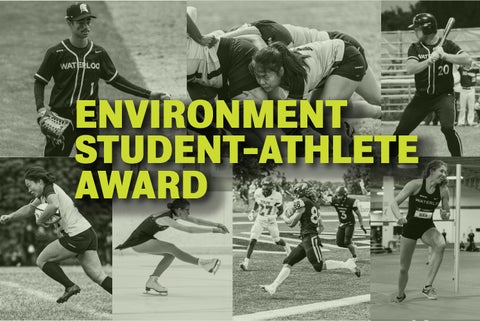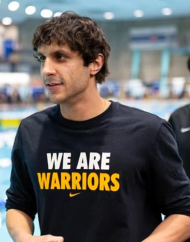Recognizing students who pursue both sports and studies
Environment students are highly interdisciplinary, with a diversity of passions, including sports, that enrich their studies as well as their physical and mental well-being. Juggling the financial and time-constraint demands of their academics and athletics is no small feat. The Environment Student-Athlete Award recognizes students who through the pursuit of both sports and studies, become resilient leaders and problem solvers with an awareness of social and sustainability issues.

Support our students
Please consider supporting Environment Student-Athletes and taking advantage of the Faculty's matching opportunity for cash or multi-year pledge gifts over $2,500 in value. A maximum total of $40,000 will be matched, to build an endowment that can support up to two awards per year.
The environment student-athlete award is available to full-time domestic and international undergraduate and graduate students enrolled in any year of any program in the Faculty of Environment, who are also members of a Warriors varsity team. Applications are submitted through Student Awards & Financial Aid. Recipients are selected based on a combination of athletic talent, contributions to the team and school, and academic success criteria. A minimum of one award will be given out each year, at a value of ∼$1,200.
Celebrating Our Student-Athlete Recipients

REKA SOMOGYI
School of Planning, BES'26
Varsity Figure Skating
2026 Recipient
Reka received the 2026 Environment Student-Athlete Award. She was recognized for excellence in both academics and varsity figure skating, demonstrating dedication, leadership and resilience on and off the ice.
Learn more about Reka.

AIDAN IAPICCO
School of Environment, Resources and Sustainability,
BES'25
Varsity Swimming
2025 Recipient
Aidan received the 2025 Environment Student-Athlete Award as a fourth-year School of Environment, Resources, and Sustainability (SERS). Aidan was recognized for excellence in both academics and varsity swimming, demonstrating dedication and resilience in and out of the pool.
Learn more about Aidan.

FARAH EL-SHAYEB
Department of Geography and Environmental Management,
BES'24
Varsity Squash
2024 Recipient
Recipient Farah was the inaugural recipient of the Environment Student-Athlete Award in 2024. She was a Geography student in the Department of Geography and Environmental Management (GEM) and was recognized for outstanding academic excellence alongside her commitment to varsity squash. Farah’s achievements reflect a strong balance between academic distinction and athletic dedication throughout her undergraduate studies.
Learn more about Farah.